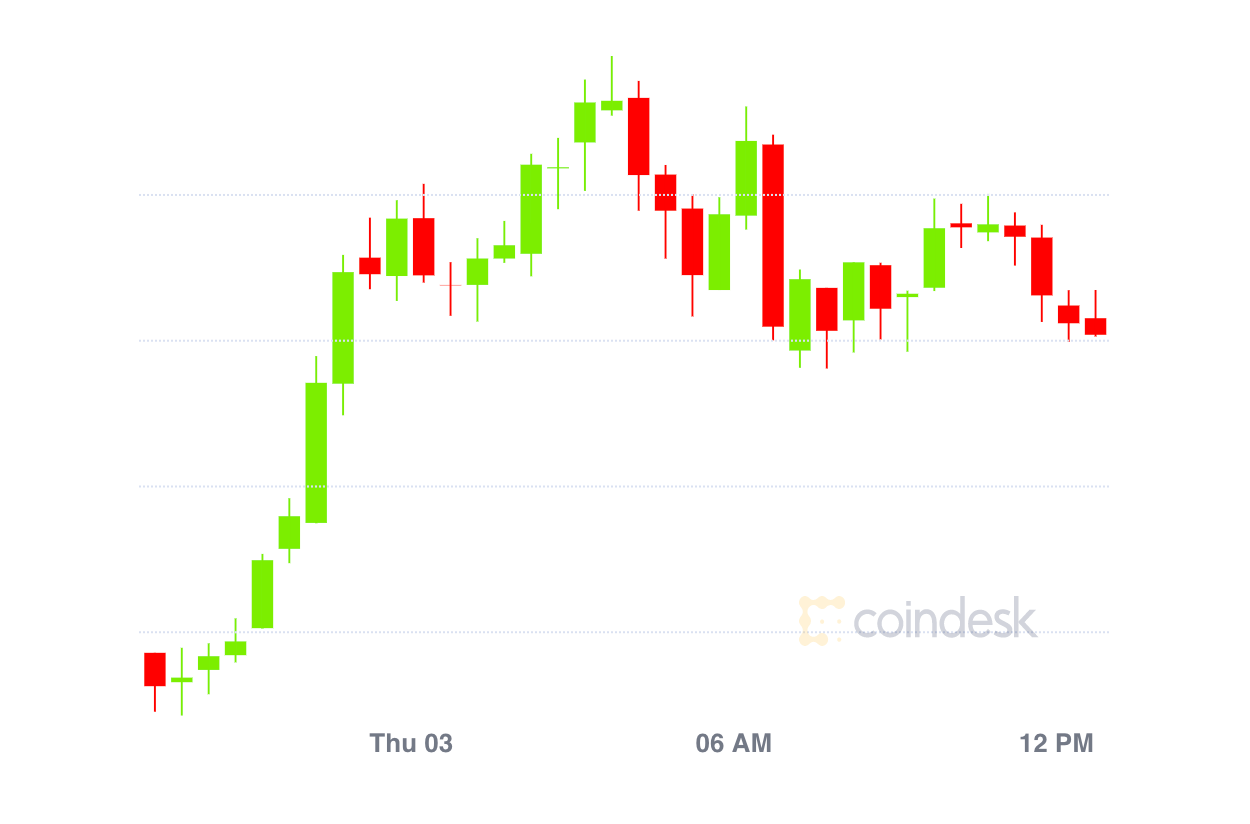Market Wrap: Bitcoin Fails Test of $40K While Ether Loses Steam Near $2.9K

Leveraged traders have not materialized in the market to take bitcoin over the $40,000 hump. Meanwhile, ether is continuing to steal trading volume from BTC during a steady price rise toward $2,900.
-
Bitcoin (BTC) trading around $38,532 as of 21:00 UTC (4 p.m. ET). Gaining 1.7% over the previous 24 hours.
-
Bitcoin’s 24-hour range: $37,311-$39,402 (CoinDesk 20)
-
Ether (ETH) trading around $2,789 as of 21:00 UTC (4 p.m. ET). In the green 1.1% over the previous 24 hours.
-
Ether’s 24-hour range: $2,673-$2,882 (CoinDesk 20)
Bitcoin swaps stay steady
Bitcoin, the world’s largest cryptocurrency by market capitalization, was up Thursday by 1.7% as of press time. It was below the 10-hour moving average but above the 50-hour, a flat signal for market technicians.
BTC’s price jumped from $37,311 at 05:15 UTC (10:15 p.m. ET Wednesday) to $39,402 by 13:30 UTC (6:30 a.m. ET) Thursday, a 5.6% gain based on CoinDesk 20 data. Bitcoin then settled somewhat, at $38,532 as of press time.
Related: Anti-Virus Service Provider Norton Rolls Out Ether Mining Feature
“We expect spot bitcoin to trade in a range short term with a slight bullish bias as frenzied leveraged longs have been washed out,” noted quant trading firm QCP Capital in its most recent investor note. “We’ve seen significant buying and selling at $30,000 and $40,000 levels, respectively.”
According to data aggregator Skew, the cost of perpetual swaps, which is liquidity provided to leveraged traders, has consistently hovered near zero (0%) since May 26.
It’s a sign many traders aren’t piling up leverage to go directional either way because the funding rates will pop or fall based on bull or bear orientation.
“BTC tried to break $40,000 to break out of the $30,000-$40,000 range that we’ve been stuck in after the mid-May crash,” said Elie Le Rest, a partner at quantitative trading firm ExoAlpha. “So the $40,000 line seems to be breakable as market participants are regaining confidence after the big crash two weeks ago.”
Related: How ‘Green’ Can Bitcoin Really Be? A Comparison of PoW and PoS
On May 23, bitcoin hit a three month low of $34,259, while ether dipped to $2,080 that day.
Read More: Bitcoin Attempts Price Breakout, While Analysts See Limited Upside
BTC volatility rising, ETH takes a breather
Thirty-day volatilities in BTC (46%) and ETH (68%) have picked back up after having dipped to 2021 lows on April 15. Ether’s 30-day volume, for instance, went to a whopping 175% Tuesday before slipping while bitcoin’s seems to keep rising, at 92% as of Wednesday’s closing data.
“We are still cautious of a potential BTC downside as the volatility skew remains high with puts being substantially more expensive than calls,” QCP Capital noted Thursday. “We reckon that downside vols are a decent sell.”
The steady rise in volatility comes after the big price dump for crypto on May 23, noted David Russell, VP of Market Intelligence at brokerage TradeStation Group.
“It’s natural to expect higher volatility after the kind of sell-off we got in late May,” said Russell. “It’s also normal for prices to pause and consolidate after a big move.”
Ether volumes bigger than BTC again
The second-largest cryptocurrency by market capitalization, ether, was trading around $2,789 as of 21:00 UTC (4:00 p.m. ET), gaining 1.1% over the prior 24 hours. The asset is below the 10-hour moving average but above the 50-hour, a sideways signal for market technicians.
Ether gained from $2,673 at 02:00 UTC (7 p.m. ET Wednesday) to $2,882 by 13:15 UTC (6:15 a.m. ET) Thursday a 7.8% climb based on CoinDesk 20 data. ETH has since lost some steam, at $2,789 as of press time.
For the past five days, ether’s daily trading volume on major spot exchanges tracked by CoinDesk Research has been higher than bitcoin’s. It’s a stretch of consistency that goes back a month so far, as 14 days out of the last 30 saw ETH’s trading volume higher than BTC.
George Clayton, managing partner of investment firm Cryptanalysis Capital, says newer capital coming into the space might be looking at the prospects of ether over bitcoin for the future, leading to higher volumes.
“Maybe ETH is seeing a bit more institutional flow,” Clayton said. “For institutions that have successfully fit crypto into their compliance frameworks and are already invested in BTC, ETH is the next step.”
Read More: Crypto Credit Rating Firm Credmark Pivots to Modeling DeFi Protocol Risks
Costs of using Ethereum drop
The cost of “gas,” the fees paid in ether to use the Ethereum network, is near a three-month low. After spiking to an astounding 305 gwei median or middle price for interacting with the network on May 11, that price has slipped to as low as 24 gwei by May 30. Gwei is defined as one-billionth of one ETH so 1 gwei equals 0.000000001.
The drop in fees is a good sign that despite increasing usage of the Ethereum network, the costs are much lower than they have been in some time. This is especially true as ether’s price has been slowly trending up, which has historically caused fees to jump, noted TradeStation’s Russell.
“Ether is already back near its early-May levels,” Russell told CoinDesk.
Other markets
Digital assets on the CoinDesk 20 are mostly higher Thursday. Notable winners as of 21:00 UTC (4:00 p.m. ET):
Notable losers:
Equities:
Commodities:
Read More: Online Broker eToro Added 3.1M New Clients in First Quarter: Report
Treasurys:




